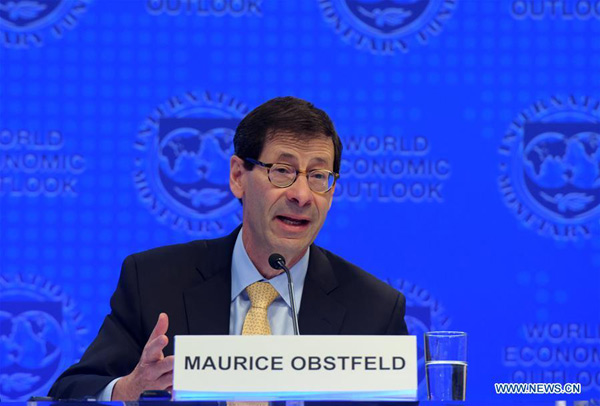IMF raises China 2017 growth forecast due to its progress in economic reform
 |
|
Maurice Obstfeld, chief economist at the International Monetary Fund (IMF), attends a press briefing at the IMF headquarters in Washington D.C., the United States, on Oct 10, 2017. [Photo/Xinhua] |
NEW YORK — The International Monetary Fund (IMF)'s move to raise its forecast for China's economic growth to 6.8 percent reflects the country's recent progress in trimming financial risks and deepening economic reform, US experts have said.
Impressive growth rate
In its latest World Economic Outlook released Tuesday, the IMF expected the Chinese economy to grow 6.8 percent this year and 6.5 percent next year, both 0.1 percentage point higher than its previous forecast in July.
"The growth rate is wonderful compared to the growth of many other countries," Farok Contractor, a distinguished professor at Rutgers Business School, told Xinhua on Tuesday.
"Of course it has come down from the previous eight or ten percent, but that is still a very healthy growth rate and that should be the envy of any other country in the world," he said.
According to IMF, the upward revision to the 2017 forecast reflects "the stronger-than-expected outturn in the first half of the year underpinned by previous policy easing and supply-side reforms."
"There have been a lot of achievements in economic management in China...I would say that the 6 percent path the China is on will be sustained for quite some time now," Contractor noted.
Deepened reform
In the past few years, China has been intensifying its efforts to trim financial risks and shift the economy from large-scale stimulus towards consumption, services and innovation.
Analysts said such structural reforms could help the country to maintain a more sustainable economic growth in the long run.
Paul Sheard, executive vice president and chief economist of S&P Global, told Xinhua in a recent interview that China's credit-fueled infrastructure and residential housing investment in the past decade led to a build-up of debt and credit in the economy, which is why economic reforms are critical.
China has adopted a range of measures to manage debt risks and push forward reform in recent years, including introducing a new high-level committee on financial stability and development in July.
Stephen Roach, a senior fellow at Yale University and former chairman of Morgan Stanley Asia, lauded Chinese government's determination to reduce financial risks.
"China's central bank, the China Banking Regulatory Commission, and the State Council have all taken explicit actions in 2017 to reduce the expansion of debt - especially the mounting indebtedness of State-owned enterprises," said Roach in a recent interview with Xinhua.
"These efforts now seem to be having a positive impact...As long as China continues to emphasize financial stability - and takes actions aimed at promoting it - the threat to growth and development should not be serious," the expert added.
Sheard said it's important that institutional and market-enhancing reforms that create the right incentives for capital to be allocated efficiently continue to be implemented.
He points out that reforms should also continue for the necessary rebalancing of the economy from excessive reliance on investment to household consumption becoming the key driver of economic growth and rising living standards.
China's economy expanded 6.9 percent in the first half of 2017, with consumption and services, and new innovation-driven economic sectors taking up larger roles, according to data from the National Bureau of Statistics.
Greater contributions
"In the last five or ten years, more than one-fourth of the world's economic growth has come from China alone, and that's a big stabilizing factor," said Contractor.
In face of the trend of de-globalization in western countries, the professor expected China to play a more crucial role in global economic development.
"Unfortunately we're in an era where in the countries like the United States and Europe, there is a lot of introspection, inward looking, angst (towards globalization)," Contractor said.
"To maintain the path of progress for humanity economically and socially requires a country like China to take the leadership position in setting the rules," said the expert, who has been visited China for many times.
In terms of international business, "whether it is exports or foreign direct investment, you also need leadership. While the west is in a state of self-questioning, China can play a role," he said.

























